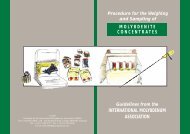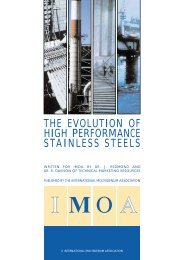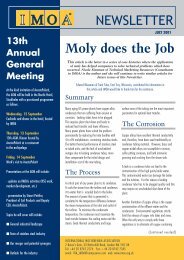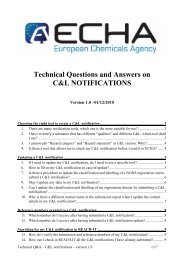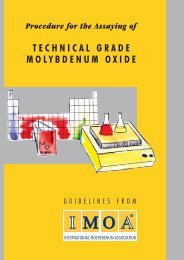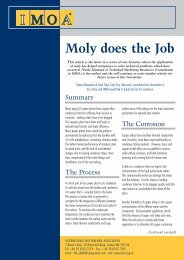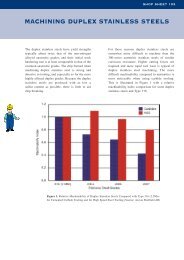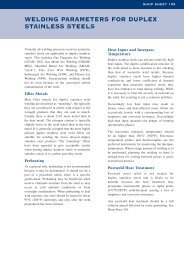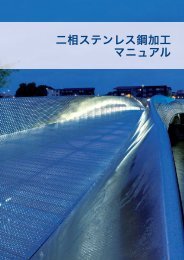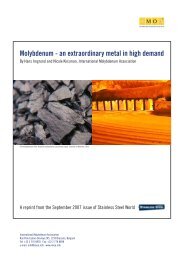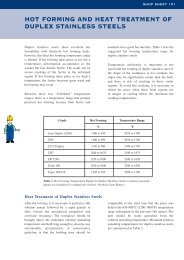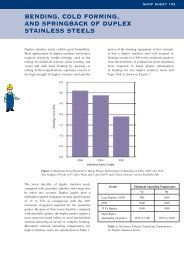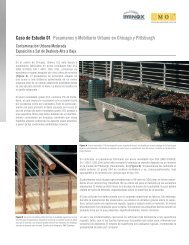2003 - IMOA
2003 - IMOA
2003 - IMOA
You also want an ePaper? Increase the reach of your titles
YUMPU automatically turns print PDFs into web optimized ePapers that Google loves.
Stainless<br />
Steel in<br />
Automobiles<br />
The International Stainless Steel<br />
Forum (ISSF) and <strong>IMOA</strong> are jointly<br />
organizing a session on "stainless<br />
steel" at the 2004 Society of<br />
Automotive Engineers (SAE) World<br />
Congress to be held March 8-11, 2004<br />
in Detroit. The call for papers within<br />
and outside of ISSF yielded ten<br />
relevant abstracts on stainless steels<br />
for automotive applications. This is<br />
enough to fill a full day program at<br />
the Conference. Most papers come<br />
from stainless steel producer<br />
companies, often jointly written with<br />
industry partners. <strong>IMOA</strong>’s Technical<br />
Director, Dr. Nicole Kinsman is the<br />
official session organizer and<br />
Chairperson.<br />
In the past years there have been<br />
sessions concentrating on aluminum,<br />
steel, magnesium, plastics and other<br />
materials but not one dedicated to<br />
stainless steel. Automotive engineers<br />
are often not familiar with the great<br />
properties (especially the mechanical<br />
properties) of stainless steels and are<br />
therefore not specifying them. The<br />
special session at the next SAE<br />
conference is intended to make<br />
automotive specifiers aware of the<br />
design possibilities with stainless steel.<br />
EU New<br />
Chemicals<br />
Policy – the<br />
Facts<br />
Counsel to the Association<br />
(McDermott, Will & Emery) has<br />
prepared the information below<br />
which provides a concise<br />
introduction to the NCP and<br />
contains proposals for the most<br />
practical and economic method<br />
of organising and preparing for<br />
compliance by the formation of<br />
consortia to save individual<br />
companies time and money.<br />
For any company which<br />
produces molybdenum in, or<br />
exports molybdenum to, the EU,<br />
the obvious consortium to join is<br />
<strong>IMOA</strong> itself.<br />
Introduction<br />
The European Commission has proposed an<br />
expansive new policy requiring chemical and<br />
metallurgical manufacturers and importers to<br />
register each substance manufactured or<br />
imported into the European Union. The key<br />
provisions of the proposed system are set out<br />
in a 1200 page consultation document, known<br />
as "REACH" (standing for registration,<br />
evaluation and authorisation of chemicals),<br />
published on 07 May <strong>2003</strong>. REACH creates a<br />
new system designed to deliver the<br />
information needed to identify the status of<br />
chemical substances in use in the EU<br />
and minimise the potential health and<br />
environmental risks from these various<br />
chemical substances.<br />
The new system will place an obligation on<br />
individual companies to submit a technical<br />
dossier and register any chemical substance<br />
manufactured or imported into the EU in<br />
quantities of more than 1 tonne. In order to<br />
assist companies with the registration process,<br />
the Commission recommends the creation of<br />
industry consortia.<br />
These consortia will enable the joint<br />
development, submission and sharing of<br />
information with the aim of reducing the<br />
compliance burden on individual companies<br />
and preventing unnecessary additional animal<br />
testing.<br />
In order to help companies to organise<br />
themselves and begin the compliance process,<br />
McDermott, Will & Emery have designed a<br />
standard "Chemicals Policy Consortium<br />
Package". The package includes the necessary<br />
legal documents for the initial formation and<br />
operation of such consortia. The materials are<br />
available in a form that can be tailored to meet<br />
the particular needs of industry groups or<br />
individual companies.<br />
Chemical Substances<br />
The new system requires the registration of<br />
chemical substances manufactured or<br />
imported into the EU. The chemical<br />
substances that require registration are<br />
chemical elements and compounds in their<br />
natural state or obtained through a<br />
manufacturing process. Any substances<br />
previously notified under Directive 67/548/EC<br />
(which covers the labelling of dangerous<br />
substances) will automatically be considered as<br />
registered. There are special rules<br />
concerning polymers and intermediates. The<br />
Commission has also provided a list of<br />
substances which do not require registration.<br />
Finally, any substances which are the<br />
subject of other EC Directives do not require<br />
registration(e.g.medicinal products, food<br />
additives and food flavourings).<br />
5



